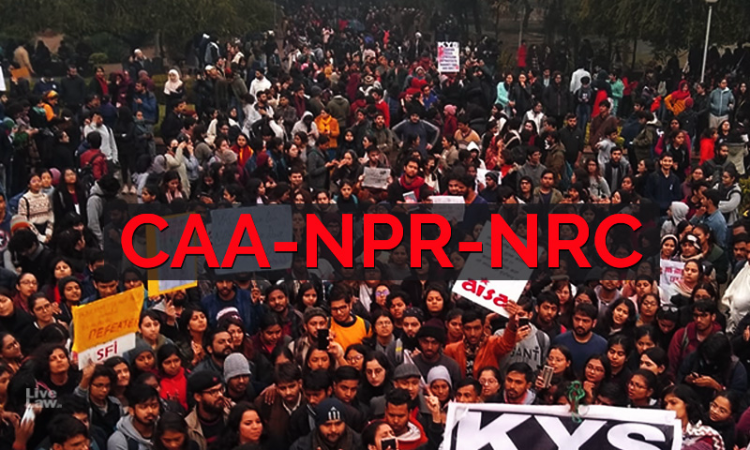Supreme Court To Hear PIL Challenging Legislative Competence Of State Assemblies In Adopting Resolutions Against Central Statutes Like CAA/Fram Laws
Srishti Ojha
11 March 2021 7:33 PM IST

Supreme Court of India will on Friday hear a plea challenging the legislative competence of diverse State Assemblies in adopting 'Resolutions' against central statutes like CAA and farm laws which fall under the Union List of the Seventh Schedule.
A bench of CJI SA Bobde and Justice Bopanna will hear the PIL filed by Samta Andolan Samiti impugning the Legislative actions of four different State Legislative Assemblies of Rajasthan, Kerala, Punjab and West Bengal which according to the petitioner, have infringed Fundamental Rights of all Indian citizens.
The petition has been filed to raise a question of law as to whether within the Constitutional framework, more particularly Article 213(2)(a) and Article 246(1), any State Legislature can adopt 'Resolution' adversely criticising a central Statute which falls in List I of the Seventh Schedule.
According to the petitioner the State Legislatures of Rajasthan, Kerala, Punjab and West Bengal purportedly adopted Resolutions condemning and adversely criticising the Citizenship (Amendment) Act, 2019 even after it was passed by both Houses of the Parliament and received Presidential assent being duly notified in the Gazette of India. The Act had come into effect on 12th December 2019, followed by about sixty purported Writ Petitions challenging the Constitutional validity of the said Legislation being filed and pending adjudication before the Supreme Court, wherein notices were also issued. Further, the Legislative Assembly of West Bengal has of late again adopted a Resolution against three other recently passed central Legislations (farm laws) emanating from List I which have also been challenged before the Supreme Court by way of Writ Petitions.
According to the petitioner, the Rules of Procedure of the these Legislative Assemblies framed under Article 208 contain chapters titled 'Resolutions' and the same, apart from imposing a precondition upon the Speakers to decide the admissibility of the Resolution before allowing the same to be placed in the Assembly, also prohibit subjects which are not primarily the concern of the State Government and on which litigations are pending.
The petitioner has argued that the impugned Resolutions and the process leading to their purported adoption are patently illegal, arbitrary and unsustainable in law, as those Resolutions target a central Legislation impinging upon entry 17 of the Union List, and as such are in breach of the Constitutional embargo set out in Article 246(1).
Calling this an 'arbitrary and motivated incursion' into the Union List under the Seventh Schedule, the plea has argued that the participating legislators of the four states have infringed Fundamental Rights of the people thus manifestly violating the 'oath of office' administered by them while being made members of the respective Legislative Assemblies.
The petition has further argued that the facts and circumstances of the present case fall way beyond the narrow confines of Article 213(2)(a) and the whole process followed by the States is unknown to, disapproved by and in violation of the Constitution of India. Under Article 213(2)(a), when an Ordinance is brought, but before the expiration of six weeks from the reassembly of the legislature, the members of the Legislative Assembly want to disapprove the contents of the Ordinance and the said disapproval is agreed to by the members of Legislative Council, the same is liable to be done by way of passing a Resolution by the Legislators to that effect.
The petition has further stated that, while interpreting the scope and purports of Article 194 of the Constitution, in Powers, Privileges and immunities of State Legislatures
Re, the Court had held that the freedom of speech of the legislator contained in the said provision relates only to the regulation of the procedure of the Legislation and as such is independent of the freedom of speech guaranteed under Article 19(1)(a). It was further held inter alia that the said freedom of speech with regard to legislative procedures only is absolute and unfettered and the Legislators are immune from any action in a Court of law.
The petitioner has argued that the said perception of immunity has purportedly encouraged the these States to facilitate passing of the impugned resolutions, as since
the said immunity protects Legislators who misuse their limited freedom of speech and purposely violate provisions of the Constitution from disqualification for membership within Article 191 of the Constitution, no disciplinary action can be taken by the Governor under Article 192 against them even in the face of blatant legislative overreach offending Article 246 and the Union List in the Seventh Schedule.
According to the petitioner, the Speakers of these State Legislative Assemblies did not apply their mind to the fact that the State Assemblies had no jurisdiction to make laws on the subject matter of the central statute in question which did not per se concern any particular State Government. They could therefore not discuss, debate or pass Resolutions against the said central legislation. The Speakers also failed to consider that many writ petitions challenging the Constitutional validity of Citizenship (Amendment) Act,2019 were already pending adjudication before the Court when the said Resolutions were passed and should have therefore rejected those resolutions.
The plea has cited the case of Raja Ram Pal Vs. Hon'ble Speaker, Lok Sabha (2007) where it was also held inter alia that the action of the Speaker on the floor of the Legislature is open to judicial review. It has also cited order that in the case of State of W.B. Vs. C.P.D.R. (2010) where it was held by a Constitution Bench of the Supreme Court that judicial review is otherwise essential for resolving the disputes regarding the limits of constitutional power and constitutional limitations as an ultimate interpreter of the Constitution


